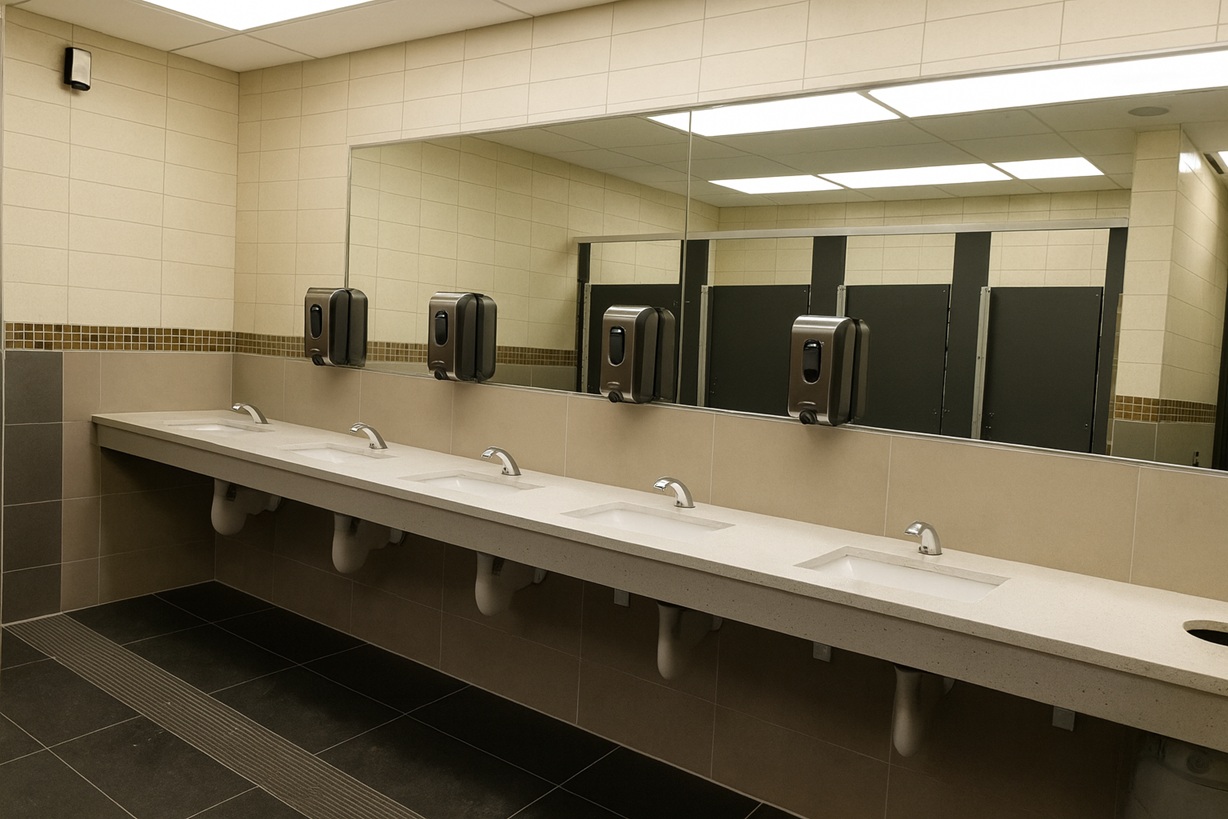Schools & Institutions: Encouraging Hygiene with Automatic Soap Dispensers
A technical note on how automatic soap dispensers support healthier schools and campuses by connecting hygiene, accessibility, durability, sustainability and campus-wide digital management.
Hygiene as a Building-Performance Issue in Schools
Educational buildings—from K–12 schools and universities to technical colleges and training centres—concentrate large numbers of occupants in dense, shared environments. Restrooms, cafeterias, laboratories and gym facilities become high-frequency touchpoints where pathogens can spread rapidly.
Public health data show that proper hand hygiene is one of the most effective measures for reducing respiratory and diarrhoeal infections, with structured handwashing programmes in schools associated with substantial reductions in illness-related absenteeism.
In this context, automatic soap dispensers are not simply convenience accessories. They are engineered components within a broader handwashing system that must meet requirements for accessibility and usability (including ADA 2010 Standards), durability and vandal resistance, integration with WaterSense-labelled faucets, compliance with green-building frameworks such as CALGreen and coordination with ASME and related plumbing-performance standards.
For architects, engineers and facility planners, that means treating soap dispensers as part of the building’s sanitary and environmental infrastructure rather than as late-stage accessories.
Hand Hygiene in Educational Occupancies


Infection Transmission and Absenteeism
School-age occupants have frequent close contact, share surfaces and often follow hygiene instructions only inconsistently. Evidence from public health agencies indicates that many respiratory and diarrhoeal illnesses are preventable through consistent handwashing with soap and water, and that targeted handwashing programmes can significantly reduce illness-related absenteeism.
From a design perspective, that makes soap dispensing hardware part of a risk-reduction strategy that affects educational continuity and attendance-based funding, indoor environmental quality metrics and community perception of school safety and hygiene standards.
Behavioural Support Through Equipment Design
Automatic dispensers support age-diverse user groups by eliminating the need to touch potentially contaminated pump handles, providing consistent metered doses that reduce uncertainty and lowering the mechanical effort required for younger children or users with limited grip strength.
These behavioural supports are particularly relevant for early childhood classrooms and special-education facilities where fine-motor challenges or sensory sensitivities are more common. Clear visual cues, intuitive alignment with faucets and, where appropriate, gentle audio or light feedback can further help students understand that the system is working as intended.
Design and Specification Requirements
Accessibility and ADA Considerations
Automatic soap dispensers in school restrooms, nurse’s offices and accessible classrooms must comply with the 2010 ADA Standards for Accessible Design. Operable parts and sensor target zones must fall within compliant forward and side reach ranges—typically a maximum of 48 inches (1220 mm) above finished floor for unobstructed forward reach.
Sensors should activate with minimal positional precision and without tight grasping, pinching or wrist twisting; any manual override must follow the same principles. Dispensers must be located within ADA-compliant clear floor space, coordinated with lavatories, grab bars, mirrors and other restroom accessories.
For architects, this usually means coordinating dispenser locations early in the layout process rather than leaving them to field placement.
Durability, Vandal Resistance and Safety
Educational facilities must anticipate both high usage and occasional misuse. Specification language should address construction materials—such as stainless steel or high-impact polycarbonate housings—and chemical-resistant internal components compatible with district-approved soaps.
Vandal-resistant design details include tamper-resistant fasteners, concealed mounting plates and lockable covers. Ingress protection and moisture management are also important: enclosures should be suitable for wet environments and include sealed electronics with gasketed housings.
Combined systems, such as integrated faucet–soap–dryer troughs, may fall under ASME/CSA standards for stainless steel plumbing fixtures and handwashing systems; mechanical and plumbing engineers should verify that product data references applicable standards and local plumbing approvals.
Educational Use-Case Planning
Designers should plan for distinct use-cases across the campus:
- Core restrooms with high-capacity units sized for peak class-change usage and after-school events.
- Cafeterias and food labs with dispensers located at handwash stations adjacent to serving and preparation areas.
- Early childhood and special-education classrooms with lower mounting heights, highly responsive sensors and clear visual cues.
- Athletic facilities and laboratories with corrosion-resistant materials and robust housings to withstand more intensive conditions.
Hygiene Performance: Sealed vs Bulk Refillable Systems


Contamination risk in soap systems is a non-trivial engineering concern. Studies in environmental health literature indicate that bulk refillable dispensers can become contaminated with heterotrophic and coliform bacteria, sometimes at significant rates, while sealed or cartridge-based systems exhibit much lower contamination risk.
For schools and universities, this has several design implications. Closed or sealed refill systems are often preferred in health-science labs, nurse’s suites and other high-risk areas; written maintenance protocols for cleaning, inspection and refill operations are essential. Where bulk refill systems are used, clear procedures are needed to avoid topping off, mixing old and new product or leaving reservoirs open to the environment.
Coordinating with infection-prevention staff or school nurses—particularly on health-oriented campuses—helps ensure that the chosen system aligns with institutional risk tolerance and policy.
Sustainability: Soap, Water and Materials


Controlled Dosing and Soap Consumption
Automatic dispensers cut down greatly on the problem of both over- and under-dispensing compared to traditional manual dispensers. Studies from environmental health literature also show that automatic portion control helps cut down on soap use by as much as 40% compared to uncontrolled manual dispensers.
For schools and institutions, this supports sustainability objectives and budget constraints by reducing per-capita soap consumption, lowering the frequency of deliveries and storage needs and limiting packaging waste.
Alignment with Sustainable Materials Management
The U.S. EPA’s Sustainable Materials Management (SMM) framework encourages lifecycle optimisation of materials use—from procurement through disposal. For educational facilities, this translates into selecting bulk refill formats with reduced single-use plastic components, coordinating refill products with district green purchasing standards and including soap systems in broader waste-reduction and recycling plans.
Integration with WaterSense and CALGreen
Although WaterSense primarily certifies water-using fixtures such as faucets and toilets, soap-dispenser design must be coordinated with WaterSense-labelled faucets to support efficient yet adequate handwashing.
In California and jurisdictions adopting similar frameworks, CALGreen establishes mandatory water performance requirements for non-residential plumbing fixtures. From a specification standpoint, faucet flow rates, activation times and sensor positioning must align with dispenser location to ensure effective lathering within a low-flow envelope, while counter depth and basin geometry should prevent splashing and encourage proper handwashing under these flow conditions.
System Integration and Campus-Wide Management


IoT and BMS Integration
For large campuses, manual monitoring of dispenser levels is inefficient. Emerging solutions link dispensers to building or campus management systems for refill-level monitoring, battery-status reporting and fault alerts.
Where BMS or CMMS platforms already exist, specifying network-capable soap dispensers allows predictive maintenance, route optimisation for custodial staff and data-driven evaluation of hygiene-programme effectiveness.
Energy and Power Strategy
Engineers should review power-source options—long-life battery versus low-voltage hard-wired—relative to access for replacement and local electrical codes. Standby power consumption becomes particularly important when hundreds of units are deployed across a campus.
Serviceability is also critical: design access for battery changes or power-supply servicing so that finishes, tilework and casework remain undisturbed, and ensure that maintenance can occur during short windows between classes or outside teaching hours.
Age-Appropriate Design and Specification Implications


Age-Appropriate and Inclusive Design
For primary and secondary schools, automatic dispenser design should support quick sensor response to match short dwell times at sinks, visible feedback to confirm activation and mounting heights scaled to age group while remaining within ADA reach ranges.
Dispensers must also function effectively for staff with mobility limitations, visitors unfamiliar with the building layout and users with visual impairments who benefit from high-contrast placement and logical proximity to faucets. Design teams should consult ADA planning guides and state accessibility supplements where relevant.
Implications for Architectural and Engineering Specification
For Division 10 or Division 22 specifications, project teams can define performance criteria such as compliance with applicable ASME and CSA plumbing-fixture standards, compatibility with WaterSense-labelled faucets and CALGreen plumbing-performance requirements where applicable and minimum expected cycles or activations prior to failure.
Materials and construction sections should cover housing materials (for example, 304 or 316 stainless steel or vandal-resistant thermoplastics), corrosion resistance against approved soap formulations and sealed electronics with appropriate ingress protection.
Controls and interfaces can specify infrared or proximity sensors with defined activation range and response time, adjustable portion control with documented factory settings and BMS/CMMS integration capability. Operation and maintenance provisions should describe preferred sealed or hygienic refill systems in high-risk areas, cleaning protocols to avoid biofilm development and design for rapid cartridge or bulk-refill changes during short service windows.
When treated as engineered systems rather than commodity hardware, automatic soap dispensers in schools and institutions can support reductions in illness-related absenteeism, improve compliance with ADA accessibility standards, integrate with WaterSense, CALGreen and other performance frameworks, enhance durability and lifecycle sustainability and enable campus-wide monitoring through digital integration.
For architects and engineers, embedding these devices into the building’s sanitary, environmental and digital infrastructure results in educational facilities that are more resilient, inclusive and aligned with contemporary public-health expectations.
Use these resources to substantiate design narratives, support specification language and align educational projects with current hygiene, sustainability and accessibility guidance.
